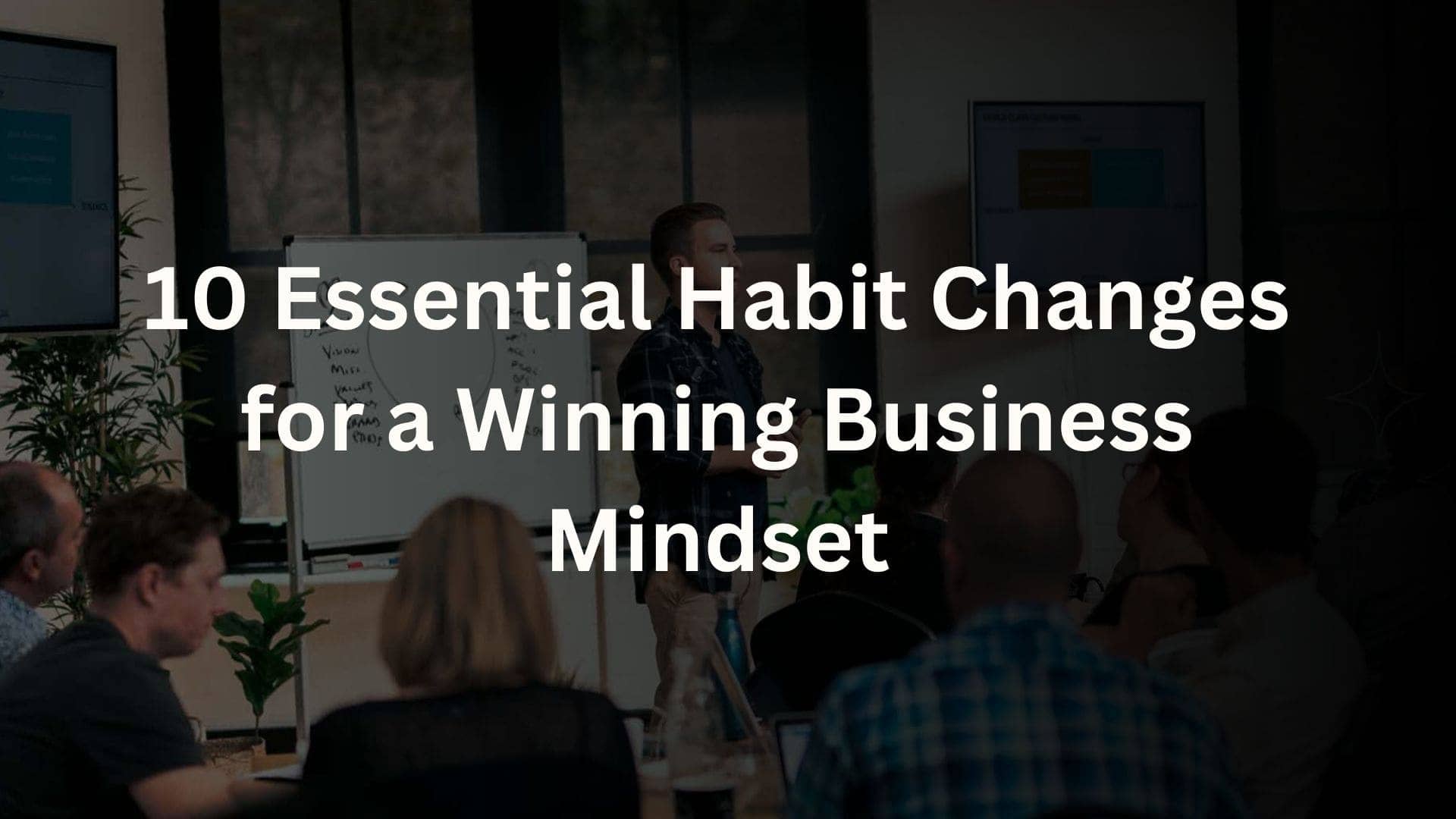In the journey of entrepreneurship, the path to success is often fraught with challenges and misconceptions. Many aspiring business owners fall victim to conventional wisdom that can hinder their growth. To build an 8-figure business, one must adopt a mindset that embraces change, innovation, and the unorthodox. This article will explore the key mindsets you need to break free from to achieve remarkable success in your entrepreneurial endeavors.
By examining the limitations of traditional beliefs and practices, we will highlight the importance of cultivating a forward-thinking perspective. You will learn how to leverage the lessons of successful entrepreneurs, adopt effective strategies, and create an environment that fosters growth and innovation.
The Importance of Mindset in Entrepreneurship
Mindset refers to the established set of attitudes held by someone. In the context of entrepreneurship, mindset plays a crucial role in shaping your decisions, responses to challenges, and overall approach to business. A positive and growth-oriented mindset can propel you forward, while a limiting mindset can hold you back.
The Role of Mindset in Business Success
A strong entrepreneurial mindset is characterized by:
- Resilience: The ability to bounce back from setbacks.
- Adaptability: Openness to change and new ideas.
- Vision: The capacity to see beyond the present and envision future possibilities.
- Collaboration: The understanding that success often comes from teamwork and collective efforts.
As we delve into the five conventional ideologies that need to be rejected, you’ll see how adopting a more innovative mindset can help you thrive.
1. “Hard Work Equals Success”
One of the most persistent myths in entrepreneurship is the belief that sheer hard work guarantees success. While diligence is essential, relying solely on effort without strategic thinking can lead to burnout and inefficiency.
Why This Mindset is Limiting
- Diminishing Returns: As your business grows, more effort does not equate to proportional results. Instead, working harder often leads to an increase in operational complexity without a corresponding increase in revenue.
- Overwhelm: Entrepreneurs can become overwhelmed by trying to do everything themselves, which can stifle creativity and hinder effective leadership.
A New Perspective
Embrace the principle of working smarter, not harder. This means:
- Prioritizing Tasks: Focus on high-impact activities that drive results rather than getting bogged down in minutiae.
- Leveraging Resources: Utilize teams, technology, and systems to amplify your efforts.
Example: Leverage in Action
Consider a company that has scaled its workforce. If a team of 10 can accomplish a task in one day, a team of 100 can do it in a fraction of the time. This is the power of leverage—doing more with less effort when properly aligned.
Key Takeaway
Shift your focus from hard work to strategic planning and efficient execution. The goal is to maximize output while minimizing input, allowing you to scale effectively
2. “Experience is the Best Teacher”
Many entrepreneurs subscribe to the belief that the best way to learn is through personal experience. While this is true to some extent, especially in the early stages of business, relying solely on trial and error can be costly and inefficient as your business grows.
Why This Mindset is Limiting
- High Costs of Mistakes: Learning through mistakes can lead to significant financial losses and wasted time, especially as the scale of your operations increases.
- Slow Growth: Waiting to learn from personal experience can delay your growth trajectory, causing you to miss out on opportunities and trends.
A New Perspective
Instead of only learning through your own experiences, leverage the wisdom and knowledge of others. Here’s how to cultivate a more effective learning strategy:
- Mentorship: Seek guidance from seasoned entrepreneurs or industry experts who can provide insights and shortcuts based on their experiences.
- Networking: Engage with peers and other entrepreneurs to share experiences, challenges, and solutions. Collaborative learning can significantly accelerate your development.
- Continued Education: Invest in courses, workshops, and resources that provide structured learning paths and up-to-date industry knowledge.
Example: Richard Branson’s Approach
Richard Branson, the founder of the Virgin Group, attributes much of his success to the advice he receives from his team and advisors. He holds regular meetings with a trusted group to discuss challenges and gather insights. This collaborative approach helps him avoid pitfalls and seize opportunities more effectively.
Key Takeaway
Adopt a mindset of continuous learning. Embrace the experiences of others to enhance your own understanding and make more informed decisions. Instead of learning the hard way, strive to achieve in years what may take others decades.
3. “The Lone Ranger Mentality”
The image of the solitary entrepreneur, tirelessly working alone to bring their vision to life, is a prevalent stereotype. However, this mindset can severely limit your business’s potential and growth.
Why This Mindset is Limiting
- Isolation: Trying to do everything yourself leads to isolation and can stifle creativity and innovation.
- Bottlenecks: If you are the only decision-maker, the growth of your business will be limited by your own capacity to manage tasks.
A New Perspective
Embrace the concept of teamwork and collaboration. Here’s how to break free from the lone ranger mentality:
- Build a Strong Team: Hire individuals who bring diverse skills and expertise to your business. Create a culture that empowers employees to take ownership of their roles.
- Delegate and Outsource: Identify tasks that can be delegated or outsourced to free up your time for strategic planning and leadership.
- Create Leaders: Focus on developing your team members into leaders. By empowering others, you can create a self-sustaining organization capable of driving growth.
Example: The Power of Delegation
Consider a startup that initially relied on its founder to handle all operations. As the company grew, the founder began to delegate responsibilities to department heads. This shift not only improved efficiency but also fostered a sense of ownership and accountability among the team, leading to innovative solutions and accelerated growth.
Key Takeaway
Realize that you do not have to do it all alone. Surround yourself with talented individuals who complement your skills and share your vision. Effective leadership is about building a strong team and empowering others to contribute to the success of the business.
4. “Sticking to a Rigid Plan”
Many entrepreneurs enter the business world with the mindset that a detailed business plan is essential for success. They often adhere strictly to this plan, believing it will guide their every decision. While having a plan can be beneficial, an inflexible approach can hinder growth and adaptability.
Why This Mindset is Limiting
- Tunnel Vision: A rigid focus on the original plan can prevent you from recognizing new opportunities or responding to market changes.
- Resistance to Change: In a rapidly evolving business landscape, sticking to a predefined plan can lead to missed opportunities for innovation and adaptation.
A New Perspective
Instead of clinging to a rigid plan, cultivate a flexible mindset that allows for adaptation and growth. Here’s how:
- Set Clear Goals but Stay Agile: Establish your primary objectives, but remain open to adjusting your strategies as needed. Regularly review your progress and be willing to pivot when necessary.
- Embrace Feedback: Actively seek feedback from your team, customers, and industry peers. Use this information to refine your approach and make informed decisions.
- Foster a Culture of Innovation: Encourage your team to think creatively and propose new ideas. A culture that embraces experimentation will enable you to pivot and adapt more easily.
Example: Companies That Pivot Successfully
Consider how companies like Netflix and Amazon have thrived by adapting their business models. Netflix transitioned from DVD rentals to streaming services, while Amazon evolved from an online bookstore to a comprehensive e-commerce platform. Both companies illustrate the importance of flexibility and the willingness to embrace change.
Key Takeaway
Rather than clinging to a rigid plan, adopt a flexible approach that prioritizes your overall vision while allowing for adjustments based on feedback and market conditions. This adaptability is crucial for navigating the complexities of scaling your business to 8 figures and beyond.
5. “Avoiding Challenges and Adversities”
It’s natural to seek comfort and stability, but many entrepreneurs fall into the trap of avoiding challenges and adversities. The instinct to retreat during tough times can severely limit growth and innovation.
Why This Mindset is Limiting
- Fear of Failure: Avoiding challenges can lead to stagnation, as fear of failure prevents you from taking calculated risks.
- Missed Learning Opportunities: Difficulties often present the greatest opportunities for growth. By avoiding challenges, you miss out on valuable lessons and insights.
A New Perspective
Instead of shying away from challenges, learn to embrace them. Here’s how to cultivate a growth-oriented mindset:
- Reframe Your Mindset: View challenges as opportunities for growth rather than obstacles. Acknowledge that adversity often leads to innovation and improvement.
- Take Calculated Risks: Don’t be afraid to step outside your comfort zone. Assess the risks and rewards of new opportunities and make informed decisions.
- Encourage a Resilient Culture: Foster resilience within your team. Encourage them to tackle challenges head-on and support them through setbacks.
Example: Learning from Failure
Many successful entrepreneurs, including Elon Musk, have faced significant failures before achieving success. Musk’s ventures, including SpaceX and Tesla, encountered numerous setbacks, but he viewed each challenge as a chance to learn and improve. This resilience has been key to his long-term success.
Key Takeaway
Challenge your instinct to avoid difficulties. Embrace challenges as opportunities for learning and growth. By cultivating resilience and a willingness to take calculated risks, you will position yourself for long-term success in building your 8-figure business
Conclusion: Embrace Unconventional Thinking for Business Success
As we’ve explored, the path to scaling your business to 8 figures is paved with challenges that require a shift in mindset. Rejecting conventional beliefs and adopting innovative perspectives can unlock your potential as an entrepreneur. Here’s a quick recap of the mindsets to break:
- The Hard Work Fallacy: Transition from believing that sheer effort equates to success. Focus on working smarter, leveraging your team, and optimizing systems for greater efficiency.
- Trial and Error Learning: Instead of learning solely from your own mistakes, harness the knowledge and experience of mentors and peers to accelerate your growth.
- The Lone Ranger Mentality: Understand the value of collaboration and surround yourself with a diverse team of experts who can contribute to your vision and drive success.
- Rigid Planning: Embrace flexibility in your planning. Set clear goals but remain open to adjusting your strategies in response to feedback and market changes.
- Avoiding Challenges: Reframe your perspective on challenges and adversities as essential learning opportunities that contribute to your growth as an entrepreneur.
Action Steps for Entrepreneurs
- Seek Mentorship: Identify experienced mentors who can provide guidance and insights tailored to your specific business challenges.
- Build a Supportive Network: Cultivate relationships with like-minded entrepreneurs and professionals who can offer advice and support during tough times.
- Prioritize Learning: Commit to continuous learning, whether through formal education, workshops, or self-directed study.
- Foster Team Collaboration: Encourage open communication and collaboration among your team members. Create an environment where everyone feels empowered to contribute their ideas and expertise.
- Embrace Change: Be proactive in seeking feedback and adapting your strategies based on new insights and market conditions.
Final Thoughts
Building an 8-figure business is not just about financial success; it’s about personal growth, resilience, and the ability to innovate. By challenging conventional thinking and adopting a mindset that values adaptability, collaboration, and continuous learning, you’ll position yourself for success in an ever-evolving business landscape.
Remember, the greatest entrepreneurs don’t shy away from challenges; they embrace them, learn from them, and use them as stepping stones to success. Your journey to building a successful business starts with a commitment to breaking the mindsets that hold you back.


